一窥模板的替换和匹配方式:偏特化的参数比泛化版本的还要多:判断是不是std::pair<,>。_stdpair模板参数太多-CSDN博客
简介
在一个项目里,调用了第三封的库,这个库里面有个类用的很多,而且其构造函数至少有6个,并且个人感觉还不够多。根据实际使用,还得增加一些。
需求
1、增加构造函数,比如除了下面的,还增加(ElementId,const std::wstring& modelName),以及FarElementId
2、希望能用通用的构造接口来生成对象,比如Create
3、希望能用指针对象(智能指针)
第三方库的6个构造函数
EditElementHandle (MSElementDescrCP descr, bool isUnmodified, DgnModelRefR modelRef);
EditElementHandle() {}
EditElementHandle (MSElementDescrP descr, bool owned, bool isUnmodified, DgnModelRefP modelRef=NULL) ;
EditElementHandle (ElementRefP elRef, DgnModelRefP modelRef=NULL) : ElementHandle (elRef, modelRef) {}
EditElementHandle (MSElementCP el, DgnModelRefP modelRef) : ElementHandle (el, modelRef){}
EditElementHandle (ElementId id, DgnModelRefP modelRef) : ElementHandle (id, modelRef) {}定义智能指针
using EditElementHandlePtr = std::shared_ptr<DgnPlatform::EditElementHandle>;定义工厂EEHFactory
struct EEhFactory
{
template <typename ... Args>
static HCHXKERNEL::EditElementHandlePtr
Create(Args&& ... args)
{
return std::make_shared<DgnPlatform::EditElementHandle>(std::forward<Args>(args)...);
}
};可以这样使用:
ElementRefP elRef{ NULL };
DgnModelRefP modelRef{ NULL };
auto editElementHandlePtr1 = EEhFactory::Create(elRef, modelRef);
新需求
我想这样使用,怎么办:
DgnPlatform::ElementId eid0{ 0 };
std::wstring str{ L"" };
auto editElementHandlePtr2 = EEhFactory::Create(eid0, str);
或者
auto editElementHandlePtr3 = EEhFactory::Create(eid0, std::wstring{ L"PipeDrawing" });
或者
auto editElementHandlePtr3 = EEhFactory::Create(eid0, L"PipeDrawing" );问题:相当于增加了两个构造函数。这两个函数由我们自己实现
第一个尝试:非泛化版本
先加入普通静态函数,看什么效果,能否达到重载的目的:
struct EEhFactory
{
template <typename ... Args>
static HCHXKERNEL::EditElementHandlePtr
Create(Args&& ... args)
{
return std::make_shared<DgnPlatform::EditElementHandle>(std::forward<Args>(args)...);
}
static HCHXKERNEL::EditElementHandlePtr
Create(ElementId eid, const std::wstring& modelName)
{
DgnModelRefP modelRef = NULL;
if (!MiscUtil::GetModelRefByName(&modelRef, modelName.c_str(), false, false))
return NULL;
return EEhFactoryXXX::Create(eid, modelRef);
}
};
调用:
{
DgnPlatform::ElementId eid0{ 0 };//, eid1{ 0 };
DgnModelRefP modelRef = NULL;
EEhFactoryXXX::Create(eid0, modelRef);
}编译结果是:

注意最后一句:
note: 参见对正在编译的函数 模板 实例化“std::shared_ptr<
Bentley::DgnPlatform::EditElementHandle
>
EEhFactoryXXX::Create<Bentley::DgnPlatform::ElementId&,std::wstring&>
(Bentley::DgnPlatform::ElementId &,std::wstring &)”的引用明明我们想要调用的是:
static HCHXKERNEL::EditElementHandlePtr Create(ElementId eid, const std::wstring& modelName);
结果看起来,貌似编译器优先去泛型那边了:
template <typename ... Args>
static std::shared_ptr<DgnPlatform::EditElementHandle>/*HCHXKERNEL::EditElementHandlePtr*/
Create(Args&& ... args)
{
return std::make_shared<DgnPlatform::EditElementHandle>(std::forward<Args>(args)...);
}这个第26行,就是泛型函数里的,压根没走到我们的普通函数那里。


第二个尝试:泛化版本
改造一下,想法是推导的时候,
Param1st推导成ElementId,而Param2ndst推导成std::wstring:
struct EEhFactoryXXX
{
template <typename ... Args>
static std::shared_ptr<DgnPlatform::EditElementHandle>/*HCHXKERNEL::EditElementHandlePtr*/
Create(Args&& ... args)
{
return std::make_shared<DgnPlatform::EditElementHandle>(std::forward<Args>(args)...);
}
template<typename T>
struct IsFarElementID : std::false_type
{};
template<>
struct IsFarElementID<DgnPlatform::DgnHistory::FarElementID> : std::true_type
{};
template<typename T>
struct IsElementId : std::false_type
{};
template<>
struct IsElementId<DgnPlatform::ElementId> : std::true_type
{};
template<typename T>
struct IsWstring : std::false_type
{};
template<>
struct IsWstring<std::wstring> : std::true_type
{};
template <
typename Param1st, typename Param2ndst,
typename std::enable_if<
IsElementId<Param1st>::value &&
IsWstring<Param2ndst>::value
, int>::type = 0
>
static HCHXKERNEL::EditElementHandlePtr Create(
Param1st eid,
const Param2ndst& modelName
)
{
DgnModelRefP modelRef = NULL;
if (!MiscUtil::GetModelRefByName(&modelRef, modelName.c_str(), false, false))
return NULL;
//using eid_decayType = typename std::decay<Param1st>::type;
//typename std::decay<Param1st>::type a;
//TypeDisplayer<decltype(a)> aType;
//return NULL;
return EEhFactoryXXX::Create(eid, modelRef);
}
};
调用:
{
DgnPlatform::ElementId eid0{ 0 };//, eid1{ 0 };
std::wstring str{ L"" };
auto editElementHandlePtr2 = EEhFactoryXXX::Create(eid0, str);
}
但是呢,编译结果让人大吃一惊,出现的编译提示和之前一模一样,说明压根还是没走到我们新的泛型函数里来。

这次终于引起我的注意了
Param1st推导成Bentley::DgnPlatform::ElementId&?而Param2ndst推导成std::wstring &?
至于我期望的Elementid,和const std::wstring&,压根不挨着?const跑哪去了,压根没搭理我给出的定义?
而且还是走的原来的变参的模板定义。
Bentley::DgnPlatform::EditElementHandle
>
EEhFactoryXXX::Create<Bentley::DgnPlatform::ElementId&,std::wstring&>
(Bentley::DgnPlatform::ElementId &,std::wstring &)”的引用果然泛型这玩意,水太深了。
分析函数重载
睡觉之前琢磨了一下,感觉有头绪了
首先,类EEHFactory里的两个Create函数,都是static的泛型成员变量。一个是最泛化的版本,另一个是特化的版本。
这貌似牵扯到函数重载的问题?
但看看这个:函数模板之间不能重载,把类型推导放到形参里就可以了_template 函数无法重载-CSDN博客
是不是要分两种情况,是不是存在最泛化的版本。
存在最泛化的版本时
而且当前这个泛化的版本,是属于变参的,什么类型都能接受的那种。
编译器扫描到存在一个这样的泛化版本,先用它解析了一下参数类型。由于它是引用类型(Args&& ... args),左值的变量就推导出了左值引用,
{
DgnPlatform::ElementId eid0{ 0 };
std::wstring str{ L"" };
auto editElementHandlePtr2 = EEhFactoryXXX::Create(eid0, str);
eid0和str都是左值变量,最后推到出来的类型就是左值引用:ElementId&和std::wstring&
}
auto editElementHandlePtr2 =
EEhFactoryXXX::Create(eid0, std::wstring{L"PipeDrawing"});
的推导结果就是ElementId&,和std::wstring&&好了,这个泛化版本先把类型给推导出来了,基调给定下来了,那就是ElementId&和std::wstring&。这个时候,它发现另一个Create函数,貌似可以重载,但得先检查一下,参数是否匹配。
它发现,此Create的参数是:Param1st eid和const Param2ndst& modelName
从形式上看,就不符合。
所以,最后还是走最泛化的版本。
template <
typename Param1st, typename Param2ndst,
typename std::enable_if<
IsElementId<Param1st>::value &&
IsWstring<Param2ndst>::value
, int>::type = 0
>
static HCHXKERNEL::EditElementHandlePtr Create(
Param1st eid,
const Param2ndst& modelName
)
{
DgnModelRefP modelRef = NULL;
if (!MiscUtil::GetModelRefByName(&modelRef, modelName.c_str(), false, false))
return NULL;
return EEhFactoryXXX::Create(eid, modelRef);
}那我就让你如意,重新定义一下:
把Param1st eid和const Param2ndst& modelName改成:
Param1st& eid和Param2ndst& modelName。
就没事了。
struct EEhFactoryXXX
{
template <typename ... Args>
static std::shared_ptr<DgnPlatform::EditElementHandle>/*HCHXKERNEL::EditElementHandlePtr*/
Create(Args&& ... args)
{
return std::make_shared<DgnPlatform::EditElementHandle>(std::forward<Args>(args)...);
}
template<typename T>
struct IsFarElementID : std::false_type
{};
template<>
struct IsFarElementID<DgnPlatform::DgnHistory::FarElementID> : std::true_type
{};
template<typename T>
struct IsElementId : std::false_type
{};
template<>
struct IsElementId<DgnPlatform::ElementId> : std::true_type
{};
template<typename T>
struct IsWstring : std::false_type
{};
template<>
struct IsWstring<std::wstring> : std::true_type
{};
template <
typename Param1st, typename Param2ndst,
typename std::enable_if<
IsElementId<Param1st>::value &&
IsWstring<Param2ndst>::value
, int>::type = 0
>
static HCHXKERNEL::EditElementHandlePtr Create(
Param1st& eid,
Param2ndst& modelName
)
{
DgnModelRefP modelRef = NULL;
if (!MiscUtil::GetModelRefByName(&modelRef, modelName.c_str(), false, false))
return NULL;
return EEhFactoryXXX::Create(eid, modelRef);
}
};
调用:
{
DgnPlatform::ElementId eid0{ 0 };//, eid1{ 0 };
std::wstring str{ L"" };
auto editElementHandlePtr2 = EEhFactoryXXX::Create(eid0, str);
}
下面这个例子,帮助理解,但这是个类的例子,函数可能有所不同,但仅仅是帮助理解。
A的泛化版本根本没有实现,但它是不能缺少的,否则就编译报错。
第二个A是个偏特化版本。(还是特化?)
enable_if和类的偏特化-CSDN博客
#include <iostream>
template<class T, class Enabled=void >
class A;
template<class T>
class A<T, typename std::enable_if<std::is_floating_point<T>::value>::type> {
public:
A() { std::cout << "partial specialization\r\n";}
}; // specialization for floating point types
int main() {
A<double> a;
}不存在最泛化版本时
编译器别无选择。可以编译成功。
但如果是类,必须要有最泛化的版本。
struct EEhFactoryXXX
{
///@code{.unparsed}
///此函数的功能:
/// 创建EditElementHandle的指针对象
/// 最泛化的版本
///@endcode
///@return true:成功 false:失败
///@author Simon.Zou @date 2024/02/20
//template <typename ... Args>
//static std::shared_ptr<DgnPlatform::EditElementHandle>/*HCHXKERNEL::EditElementHandlePtr*/
// Create(Args&& ... args)
//{
// return std::make_shared<DgnPlatform::EditElementHandle>(std::forward<Args>(args)...);
//}
template<typename T>
struct IsFarElementID : std::false_type
{};
template<>
struct IsFarElementID<DgnPlatform::DgnHistory::FarElementID> : std::true_type
{};
template<typename T>
struct IsElementId : std::false_type
{};
template<>
struct IsElementId<DgnPlatform::ElementId> : std::true_type
{};
template<typename T>
struct IsWstring : std::false_type
{};
template<>
struct IsWstring<std::wstring> : std::true_type
{};
template <
typename Param1st, typename Param2ndst,
typename std::enable_if<
IsElementId<Param1st>::value &&
IsWstring<Param2ndst>::value
, int>::type = 0
>
static HCHXKERNEL::EditElementHandlePtr Create(
Param1st& eid,
Param2ndst& modelName
)
{
DgnModelRefP modelRef = NULL;
if (!MiscUtil::GetModelRefByName(&modelRef, modelName.c_str(), false, false))
return NULL;
return NULL;
//return EEhFactoryXXX::Create(eid, modelRef);
//暂时切换成return NULL。因为没有函数接收ElementId和DgnModelRefp
}
//
// template <
// typename Param1st, typename Param2ndst,
// typename std::enable_if<
// IsElementId<Param1st>::value &&
// IsWstring<Param2ndst>::value
// , int>::type = 0
// >
// static HCHXKERNEL::EditElementHandlePtr Create(
// Param1st& eid,
// Param2ndst&& modelName
// )
// {
// return EEhFactoryXXX::Create(eid, modelName);
// }
};
测试:
DgnPlatform::ElementId eid0{ 0 };//, eid1{ 0 };
std::wstring str{ L"" };
auto editElementHandlePtr2 = EEhFactoryXXX::Create(eid0, str);



















